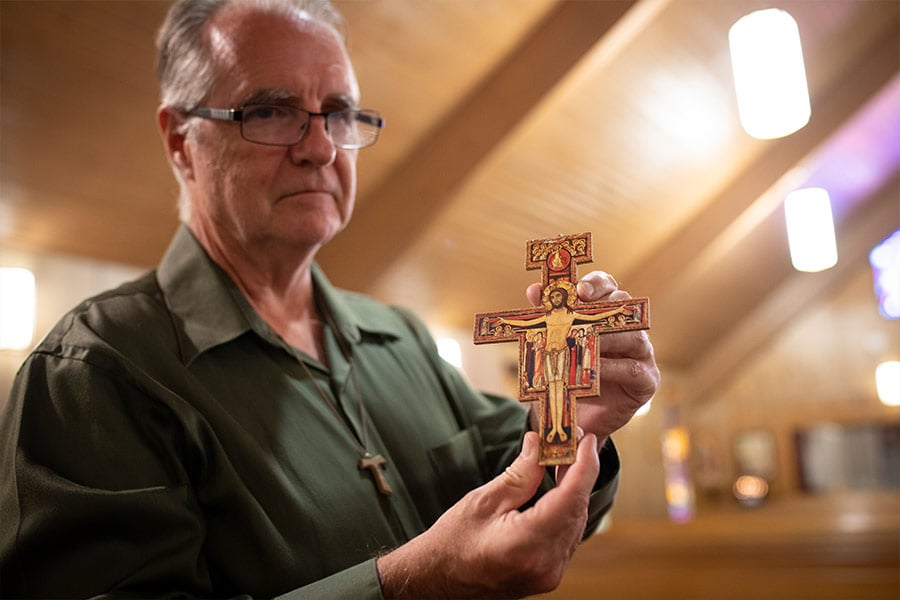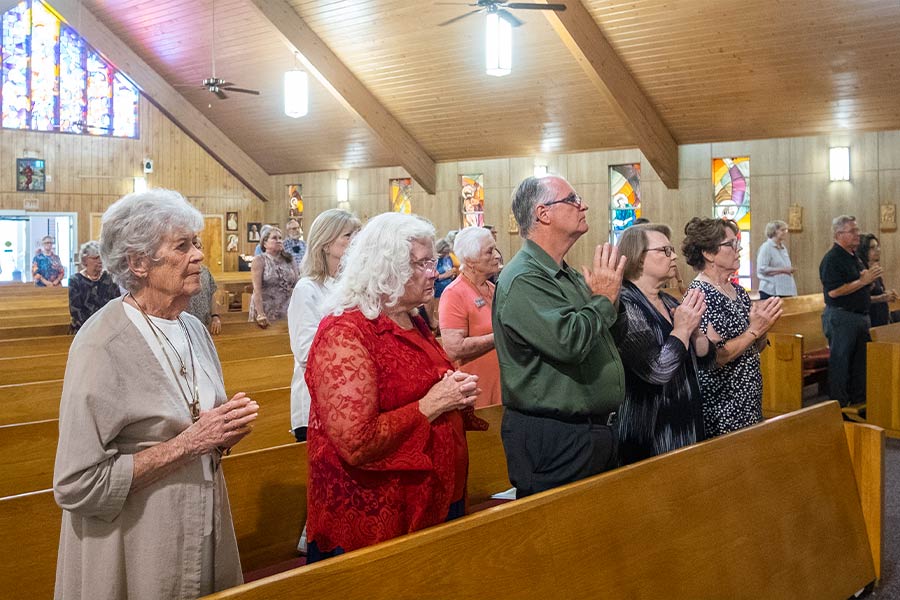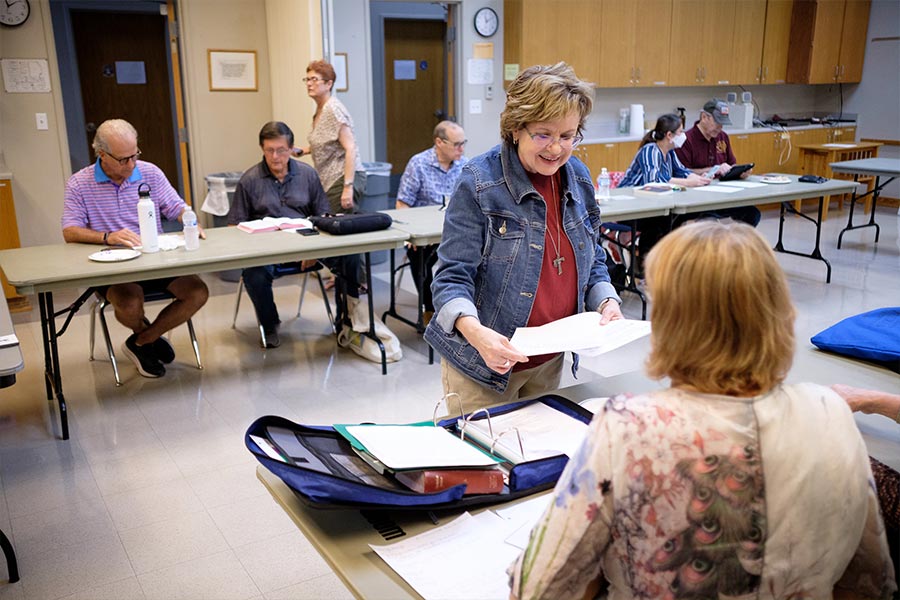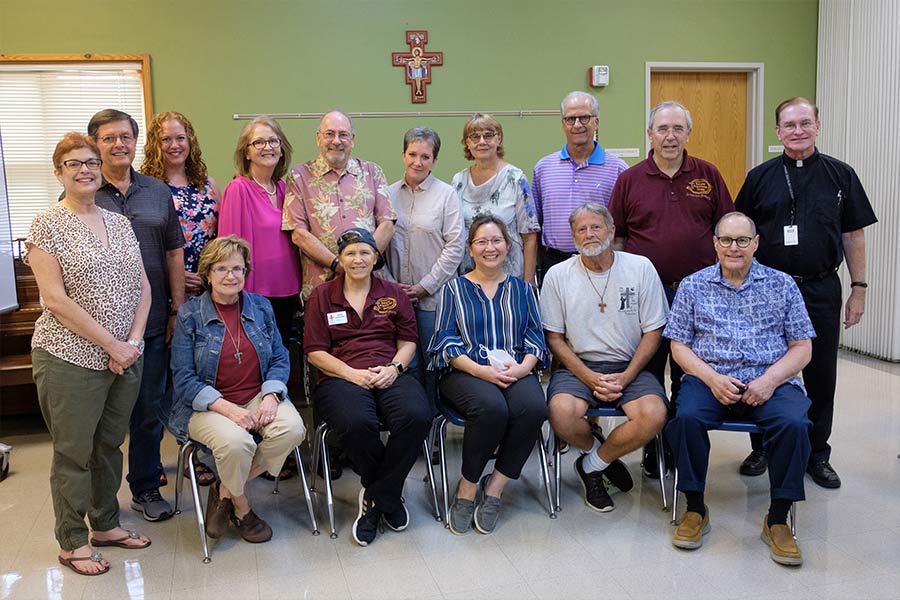Local Secular Franciscans continue walking in the footsteps of St. Francis of Assisi

Bob Wittman holds his newly-presented San Damiano Crucifix after his profession in the St. Clare Fraternity of the Secular Franciscan Order on September 12, 2021 at Saint Francis Village in Crowley. (NTC/Rodger Mallison)
CROWLEY — As Catholics worldwide celebrated the Oct. 4 Feast of St. Francis of Assisi, there is a group for whom the feast is particularly meaningful — the Secular Franciscans. These fraternities of lay men and women have been walking in the footsteps of St. Francis for 800 years.
During the 13th century, many lay people felt a strong desire to follow St. Francis, with lives of prayer and service to the poor. Many even wanted to take the same vows as St. Francis, but family obligations and other responsibilities did not allow them to join the First Order of priests and brothers, the Friars Minor, or the Second Order of St. Clare.
So, in 1221, St. Francis established a third order for lay people and wrote its first Rule himself. He called them the Brothers and Sisters of Penance and counseled them to live the Gospel in the ordinary circumstances of their lives. Later they became known as the Third Order of St. Francis and in 1978 became Secular Franciscans (OFS).
Notable Secular Franciscans throughout history include 22 popes, St. Francis de Sales, St. Joan of Arc, Michelangelo, Dante, Christopher Columbus, Louis Pasteur, and the parents of St. Therese of Lisieux.
Today, there are more than 300,000 Secular Franciscans worldwide, and the United States has more than 12,000 professed members in at least 600 fraternities. Three of those fraternities serve the Diocese of Fort Worth: Immaculata Fraternity in Colleyville, St. Clare Fraternity in Crowley, and St. Bonaventure Fraternity (for Spanish speakers) in Fort Worth.
Carol Lieser, OFS, minister of the Immaculata Fraternity, explained that Secular Franciscans, like other Franciscan orders, follow a Rule and Constitution that are canonically established by the Church. Unlike other Franciscan orders, they do not wear habits but do receive a Tau cross when they profess, which they are encouraged to wear daily. They do not live together in community but do meet regularly with their fraternities. And although they make a public profession, they do not take vows.
“But we do make promises to live our lives with chasteness, poverty, and obedience,” Lieser said. “Poverty is recognizing with all humility that everything you have is given to you by God. God owns it and you are called to use whatever you’re given in service to others.”

Jean Cate, Mona Edwards, Bob and Celia Wittman, and Patty Lovell make their profession as the St. Clare Fraternity of the Secular Franciscan Order welcomes them into their order on September 12, 2021 at Saint Francis Village in Crowley. (NTC/Rodger Mallison)
Secular Franciscans live, pray, and serve in their individual parishes throughout the diocese and gather monthly with other seculars for prayer, formation, planning, and fellowship.
Immaculata’s 17 members and two candidates (who will profess in October) come from parishes in Frisco, Plano, Arlington, Fort Worth, Colleyville, and Coppell.
Fraternities are guided by an elected minister, or president, and each fraternity has a spiritual assistant, or spiritual director — usually a priest of the First Order (OFM) or Third Order Regular (TOR).
Father John Mark Klaus, TOR, parochial vicar at Good Shepherd, has been the spiritual assistant for Immaculata Fraternity for six years. He said in addition to wearing the Tau cross, Secular Franciscans can be identified by their service in parish ministries. They are lectors, Eucharistic ministers, acolytes, and teachers of religious education.
“I’ve always been impressed by their prayer life and, following the example of St. Francis, they are there for service to the community,” he said.
“I’ve been able to see the fraternity grow spiritually and see their commitment to the fraternity and to one another as brothers and sisters,” he added.
In addition to their individual parish ministries, Secular Franciscans also work together to serve the poor in the spirit of St. Francis. The Immaculata Fraternity, which was established in 1990, has donated to food pantries, given diapers to new mothers, offered financial help where needed, and at one time, even helped build homes for the poor. This year, the fraternity will serve meals each month at Patriot House, a homeless shelter for veterans.
Lieser said she was drawn to Franciscans “because of the idea of simplicity of life and because they weren’t just contemplatives. Yes, we do pray but our prayer goes into action. So, we call ourselves active contemplatives.”
“Prayer is a resource that helps us stay on the path,” she added. “And that helps us keep our [Franciscan] promises. It’s a grace and a gift.”
Leiser said she was also attracted to Franciscan spirituality offered by John Duns Scotus, a 14th century Franciscan theologian: “that God loved us so much, He would have sent Christ into the world, even if Adam and Eve hadn’t fallen ... He always intended to have a relationship with us.”
“There’s also a Trinitarian view,” she said, “where we’re in relationship with God the Father, God the Son, and God the Holy Spirit. They invite us to be a part of that relationship with them.”
A well-known and often quoted Franciscan maxim comes directly from Article 4 of the Secular Franciscan Rule: Secular Franciscans should devote themselves especially to careful reading of the Gospel, going from Gospel to life and life to Gospel.

Carol Lieser, minister of the Immaculata Fraternity, leads a meeting of the Secular Franciscan Order at Good Shepherd Church in Colleyville on Sept. 5, 2021. (NTC/Kevin Bartram)
Carmine Esposito, OFS, minister of the St. Clare Fraternity, explained from Gospel to life and life to Gospel.
“We’re trying to establish our relationship with Christ in the way that St. Francis had,” he said. “It’s learning about contemplative prayer, bringing prayer more into our lives, and delving into Scripture more. Then we try to incorporate what we learn in the Gospel into our lives.”
For Lieser, the phrase means that “for everything I do, I figure out a way to bring Christ into it and to make it a Franciscan action.”
Esposito, a member of St. Francis Cabrini Parish in Granbury, said the St. Clare Fraternity was established in 1964 and currently has 36 members and six candidates. Eighteen members are from St. Francis Cabrini, others live at St. Francis Village in Crowley, and still others come from parishes as far away as Lipan and Tolar. The fraternity has supported Mission Granbury, a Hood County nonprofit community organization, and the St. Francis Village food bank.
Esposito and his wife, Lucy, made their profession together in 2016 after three years of formation. Candidate formation usually lasts between 18 months and three years.
“From day one, it’s a discernment process because you are making a lifelong commitment,” he said. “Not everyone wants to make that commitment. Formation gives individuals time to decide.”
Esposito explained that formation is not like trying to recruit someone to a team or a club. Rather, it is “striving to enrich your spiritual life … and formation leading up to profession doesn’t end. Continuing formation keeps you engaged and strengthens your prayer life.”
For Maria del Carmen Jimenez, OFS, minister of St. Bonaventure Fraternity, prayer is an important part of being a Secular Franciscan. She said the group meets daily for prayer at 6 p.m. on a telephone conference call, and at 8 a.m. on Saturday mornings to study the Rule of St. Francis.
St. Bonaventure Fraternity was established in 2018, and its 12 professed members and one candidate all belong to Immaculate Heart of Mary Parish in Fort Worth, where the group will gather when they are ready to return to in-person meetings. The fraternity serves the parish by bringing Eucharist to the sick and homebound.

The Immaculata Fraternity of the Secular Franciscan Order pose for a group photo at Good Shepherd Church in Colleyville on Sept. 5, 2021. (NTC/Kevin Bartram)
Pax et Bonum, meaning “Peace and All Good,” was a greeting that St. Francis often used.
When Franciscans use the greeting today, it means “to have in our hearts the joy that Francis had in doing good for others,” Jimenez said.
“The example is more important than words,” she added. “We are living the way that Francis did … and the spirit of Francis is contagious.”
